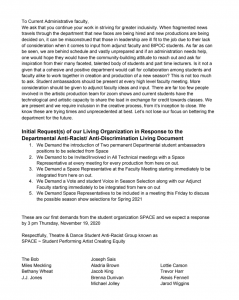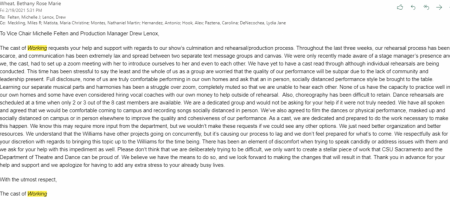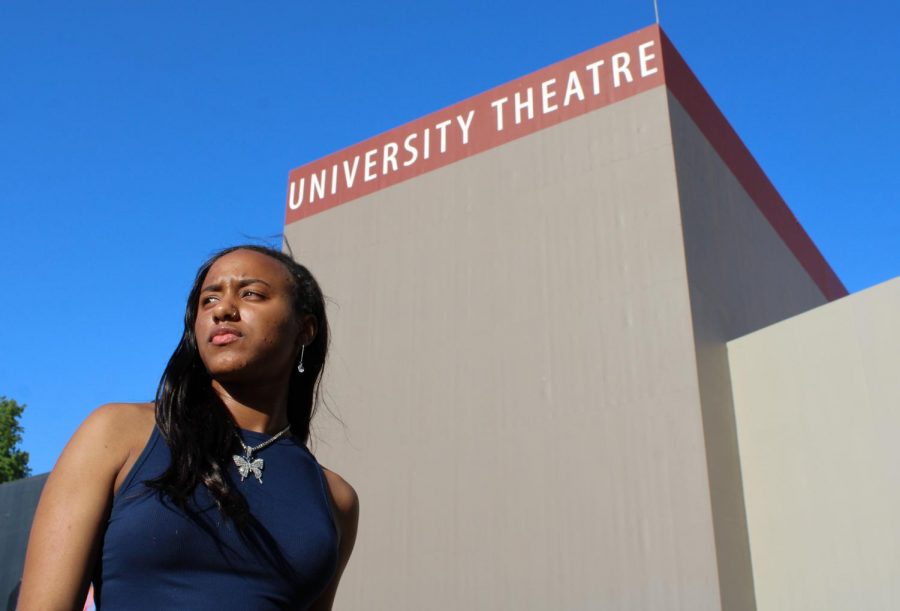Sac State theatre students call for change, reflect on department’s past with systemic racism
Community seeks dialogue about racism and anti-racist action
Aladria Brown stands outside of the university theater on Saturday, May 8, 2021. As ASI’s next director of arts and letters, she plans to collaborate with all departments and bring new ideas to Sac State.
September 9, 2021
Thirteen months after the theatre and dance department was confronted by students regarding systemic racism, theatre students at Sacramento State are reflecting on the past, recounting recent events and calling for change within the department.
As a result, students and faculty met over the summer in 2020 as a part of Black Engaged Fundamental Racial Equity Everyday or BE FREE, a series of meetings where students, faculty and alumni push for anti-racism within theatre and dance.
Last August, students and alumni spoke out against racism they experienced from professors in the department. In particular, a Filipino-American alumna from 2018 was mistreated by professors as she sought to get a musical theatre unit transferred from Oxford Brookes University.
Miles Meckling, a 22-year-old theatre alumni who graduated this spring, is one of the founders of BE FREE. He reflects on his experience with the theatre department saying the department needs to prioritize anti-racist actions.
For example, he said there needs to be implementation of mandatory anti-racist and anti-discrimination training, as well as anti-discriminatory clauses in faculty evaluations. Additionally, he added that the department should hire qualified faculty of color. Currently, the theatre and dance faculty is 65% white according to Sac State’s Faculty and Staff page.
“We have this call to the department and the university to stop functioning in a performative manner,” Meckling said. “We’re calling on you to hire and bring in qualified, diverse employees to help represent all of the students and the dynamic makeup of California.”
The theatre and dance department announced they have chosen an assistant professor for a race in set design, technology and scenography course, according to an email sent to theatre students on May 13. The department has chosen Professor Stephen Jones who was previously an assistant professor of theatrical design and director of theatre at Vassar College in New York.
The theatre and dance department’s Facebook page stated Jones’s job is centered on “antiracism and the role of designers as purveyors of cultural representation and material practices.”
Meckling said that after seeing the job title, students felt it made little sense and seemed as if the word “race” was being used to check a box.
Meckling also said that the hiring policy at Sac State is a problem. According to him, only faculty members who have been at the university for a certain amount of time with a specific status are allowed to participate on hiring committees.
Lorelei Bayne, chair of theatre and dance, said search committees consist of the department chair and at least four full-time tenured or probationary faculty members including faculty members who are a part of the Faculty Early Retirement Program. Within this line-up, the committee selects a chair for the hiring committee.
The department then appoints a Affirmative Action and Equal Opportunity Representative who is tenured or probationary and will also serve as voting member as stated in the department’s faculty recruitment guide.
This leaves out adjunct faculty who are predominantly people of color. As a result, these faculty members are not on these committees, he said.
“In that policy, it automatically sets specifically people of color for failure because they’re not at the top,” Meckling said. “So [faculty members of color] are not on these committees.”
Meckling was also a founder of Student Performing Artists Creating Equity (SPACE), which was composed of only students and facilitated by the department.
Faculty, part-time faculty, community members and alumni were left out according to Meckling because the department wanted a student-only facilitated environment.
Last fall, members of SPACE also wrote to the department with a list of five demands which included the two permanent student ambassadors, student involvement in all technical meetings for every Sac State production, a student voice in selecting adjunct faculty and a SPACE representative included in discussions for spring 2021 productions.

In response, the department asked SPACE to introduce themselves in an upcoming meeting, and regarding the list of demands the department said “based on the content we are not able to fully respond at this time.”

Members of SPACE were unable to meet at the proposed time of 3 p.m. due to class conflicts, so the group rescheduled with the department since there was a later meeting that day, Meckling explained. SPACE was first sent the wrong Zoom link to the meeting and when later sent the correct link, sat in a waiting room for 40 minutes. The next meeting where SPACE was presented, students sat in a waiting room for 15 to 20 minutes, according to Meckling.
He said students were often not treated as student representatives and their voices were dismissed.
One of the productions suggested was called “Working,” which SPACE stated features a “multi-ethnic ensemble” and is one of the “most accessible, relevant, and substantive musicals ever created.”
However, according to Meckling, the production of “Working” suffered because of the department’s “multiple occasions of neglect.” As a part of “Working,” he said cast members were “mistreated” and actors were “left in the dark.”
Members of the cast brought up concerns like the production preparation and lack of community and leadership. These concerns were sent to department in an email in February 2021, three weeks into production.

Outside student groups and initiatives, students reflect on being a theatre student post summer 2020. Looking back, Aladria Brown, a 20-year-old theatre major, said the events over last summer were egregious and disgusting.
“The theatre department has to absolutely take a hard stance against racism because of everything that happened,” Brown said. “I think that’s kind of sad. There should have already been a hard stance against racism. There shouldn’t have been an event causing you to act like this.”
Brown is the newly elected director of the College of Arts & Letters for Sac State’s Associated Students, Inc,. Moving forward, she hopes to work with the theatre and dance department to stand against racism.
“I feel like the theatre department has a long way to go,” Brown said. “But I am definitely completely invested in making things better.”
Hannah Rebanos, a 20-year-old theatre major, transferred to Sac State from Hartnell College in fall 2020. While at Hartnell, Rebanos said she faced microaggressions for being an Asian woman. Now, at Sac State, she feels safer.
But, in order to continue maintaining the safe space she has been in so far, Rebanos said the department needs to continue to talk about racism.
“One thing that’s important to realize is that some people need to notice that their ignorance is what helps racism continue,” she said. “Until they get over that, then they can’t help their students feel safe.”
While Rebanos’ experience at Sac State has been positive so far, she believes the department should continue to implement multicultural studies and have more anti-racism lectures within the curriculum, not just because of the altercations that were brought up in the summer.
“Not only should it be reserved for those classes that specifically say multicultural or Black history,” Rebanos said. “I think if it’s implemented in every subject, then I feel like that’s one way that they can continue to be inclusive.”
Patience Brown, a 20-year-old dance minor, said that as an African-American student, racism is always a “touchy subject.” But, in her African and Caribbean dance class, conversations about race centered around the George Floyd case and Breonna Taylor trials were discussed.
“It’s been hidden, but now it’s being brought to light that racism is something that people don’t think it’s still there but it is,” Brown said. “People just knew how to hide it better. But now as we’re coming forward, people need to be held accountable because this is not okay.”
Brown also mentioned how in her dance classes, there is a safe space to talk about race and racism. Rather, in her general education courses, those discussions are not happening.
Overall, Brown says she would like to see more faculty that look like her and other students of color not just in dance but at Sac State.
Alongside BE FREE and SPACE, the theatre department also has the Communities of Color Collective (CCC), a group primarily consisting of adjunct faculty members that hold meetings focusing on anti-racist planning and action.
Dance lecturer Nicole Manker, who leads the collective, said CCC started to propose a revisement for the mission, purpose and goals for the department.
Other CCC initiatives included non-performative land and labor acknowledgements, community engagement, revising the curriculum to de-center whiteness and providing resources and training about bias and anti-racist practices.
“If there’s going to be any sort of real sustainability that exists, in any way where the department’s not constantly struggling to find students, we’ve got to stop being racist,” Manker said.
Nhan Ho is an adjunct lecturer of dance and a member of CCC. He said CCC provides a safe space for students to navigate through if they don’t feel comfortable going to the department.
“We’re here as adjunct faculty members to help and assist the students,” he said.
According to Brian Blomster, director of news and communications at Sac State, the university continues to “share the goal” of ending systemic racism. Yet, President Robert Nelsen, Dean of Arts and Letters Sheree Meyer and other administrators stopped attending BE FREE.
BE FREE was never made mandatory, stated Blomster, as the College of Arts & Letters never called the meetings because they were conducted over summer.
“We continue to be committed to listening from BE FREE and working towards concrete, lasting solutions and would welcome the opportunity to do so,” Blomster wrote in an email to The State Hornet.
As Meckling is now a graduate, he hopes the theatre and dance department not only proceeds with anti-racist initatives, but becomes the family it claims to be.
“I want it to actually be the family where everyone is taken care of, listened to, heard and taken seriously,” he said. “Because when you truly love your family, you take care of them.”

































































































































Hung • Sep 14, 2021 at 8:26 pm
Yikes. This article is still posted even after all the comments. Clearly this article has some accuracey problems. Almost feels like an apology to the students of the department and department faculty is needed. State Hornet, you’re just burning bridges when you do lazy journalism.
Anon • Sep 13, 2021 at 1:17 pm
The really interesting part of this article to me is the lack of context to so much stuff. In performing arts it was primarily available to affluent people throughout the ages. Which in the United States means white people. Although many cultures have their own art form, in the US the culture around theatre and dance is often that it is a “white thing”. There’s been talks in the theatre and dance industry about how we can make theatre and dance more accessible. I believe the writer of Slave Play even made the tickets the lowest recorded cost in the history of 21st-century broadway just to all more accessibility to black, brown, poor, queer, etc. people to see the show. OSF lets all the schools see the shows they put on so kids of all backgrounds can be exposed to theatre and dance. So when you look at the rich history of theatre and dance in the united states, it makes sense that the professors are mainly white. But I don’t think every white professor is trying to be racist and of course, there is room for more diverse professors in theatre/dance. There also isn’t a large theatre/dance scene in Sacramento so its hard to incentivize people to move here. Since most T & D profs work at CSUS and performance setting too. Also Ed Brazo, the professor who was fired, let go, or quit was really a mean guy in general, but as someone who has spoken to pretty much all the professors, I think Ed Brazo was a bad apple among many great people. I think this article would’ve been interesting if you reached out to more professors white, black, native american, and asian, and asked them about their anti-racism efforts in the classroom.
Micheal • Sep 13, 2021 at 12:50 pm
An interesting statistic is that there are no Latinx professors yet the biggest minority group in the theatre department is Latinx/Hispanic. I am pretty sure that’s inaccurate. There’s a professor I know in the dance department is from Mexico and one who used to be in the theatre department that was from another Spanish-speaking country.
I also feel like this story portrays some things incorrectly. Especially as a student in the department but idk.
Anne • Sep 13, 2021 at 8:56 am
Smear campaign part 2 lol
Victor • Sep 12, 2021 at 10:58 am
Not sure why this is published. It’s clear there was a massive lack of diverse interviews and reads like a smear piece. This definitely isn’t going to help out the Theatre and Dance department. The last 4 performances have had very diverse casting, including dance shows. Word of advice, maybe investigate anti-racism efforts in male dominated majors. Guarantee Engineering, Computer Science, or Poli Sci is doing much to be inclusive. Kinda embarrassing this got published. So many holes. SMH.
Concerned Student • Sep 12, 2021 at 8:05 am
When I saw the headline for this story, I was hoping to read a balanced report that strived to show both sides of the story about a struggling department that has really tried to make accommodations for students who felt misheard and about the work that’s been done to give students more of a voice in decisions, but boy was I wrong.
This whole story reads like a profile of Miles instead of the investigative piece it presents itself as. While there are some other voices included in the story, each person is in agreement with Miles and there seems to be no conversation whatsoever between faculty and students. The whole story simply seems like a vessel for Meckling and others who agree with him about the department’s transgressions with racism and nothing more.
That wouldn’t be a problem if this was simply posted on a blog Meckling owned or a website for the groups he helped create, but this is being posted on statehornet.com and being presented as factual investigative reporting when it is everything but that.
The first major problem is the lack of mentioning how inclusive the hiring process actually was for students. As someone who has been involved with theatre for quite some time, I’m very aware of the process that the hiring committee took to make the process inclusive. They excused theatre students from any theatre classes they had at the time to allow them to watch candidates give practice lectures and encouraged students to ask questions if they had any. Students were also given surveys where they got to explain whether or not they liked the candidates and why. This is a process all theatre students were given and allowed everyone — not just members of SPACE or BE FREE — the opportunity to decide who the best candidate would be. In my opinion, this actually was a more fair and transparent process than giving a small group of students who did not accurately represent the racial makeup and beliefs of students within the department more say in the hiring process than all other students.
The second issue with the story is the clear lack of reporting in terms of speaking to faculty. It’s one thing to allow claims made by a former student who obviously has a problem with the department to run in a story, but not giving faculty a chance to explain why demands made by the student and the groups he helped create could not be completed. From my experience in theatre classes and in speaking with others, professors who were on the hiring committee were very worried about making sure students felt included in the process particularly because of another article written over a year ago by The State Hornet that didn’t give faculty an opportunity to speak for themselves on matters involving racist allegations. In fact, I wouldn’t be surprised if that article is the reason faculty chose not to respond to the reporter who wrote this since they were worried The State Hornet would simply do the same it did before — and it did.
Journalism is hard. I know that it might have been difficult getting faculty to speak, but at the end of the day, the clear lack of their perspective on these issues makes this article a smear piece rather than meeting the potential it had.
Mayra • Sep 12, 2021 at 7:04 am
Did you even give any tenured faculty a chance to respond to this? Reads so bias. Also in regards to Stephen Jones, I personally attended his lecture on race in scenography. He was super informative and had a lot of interesting perspectives on the intersection of race and sets. It’s really disappointing that you include “Meckling said that after seeing the job title, students felt it made little sense and seemed as if the word “race” was being used to check a box.” This is NOT the perspective of most students. The way you write this is as if all students felt this way. It also discredits Stephen Jones professional experience and how great of an asset he is to the department. To be honest, he’s probably way too good for the department anyway.
student • Sep 11, 2021 at 2:38 pm
Ah. Once again, I see you State Hornet, only writing about the theatre department when its something bad. Good Job!
Eric • Sep 11, 2021 at 2:24 pm
Did you guys do any outreach at all? This reads like a bias piece. This is so one sided. Also many students in the department would be eager to talk to you. I’m really disappointed in the lack of diverse students and staff quoted in this piece. You only quote black students and professors and one Asian student. The biggest minority group in the department is latinx. It’s even in your demographics. Yet you don’t quote any latinx or white students. Yes, you do need to quote white students too if you want a true conversation about diversity. Really disappointing piece. Definitely needed some more work before publishing.
Jhene • Sep 11, 2021 at 2:07 pm
The amount of appalling journalism in this is shocking, especially from the new diversity editor.
First, this article primarily relies on one student, Miles Meckling. Miles doesn’t represent every student or all of the diverse students and faculty in the department. Although Meckling has helped start some of the student ran groups that claim to represent diverse students, that doesn’t necessarily mean their actions are actually doing so.
Second, you argue that “Meckling also said that the hiring policy at Sac State is a problem. According to him, only faculty members who have been at the university for a certain amount of time with a specific status are allowed to participate on hiring committees.” I find comments like this concerning. As a journalist, you are painting the department as unfair and uninclusive. It is department policy to have tenured faculty participate in the hiring process. EVERY tenure faculty participated in the hiring process and all theatre students, Meckling included, were excused from any theatre class they had during the interviews so that everyone could voice any questions, concerns or comments to candidates and to the hiring committee. In addition, we were emailed surveys where we could say concerns we had regarding a candidate or why we liked someone.
In addition, when you say “This leaves out adjunct faculty who are predominantly people of color. As a result, these faculty members are not on these committees, he said.” and “In that policy, it automatically sets specifically people of color for failure because they’re not at the top,” Meckling said. “So [faculty members of color] are not on these committees.” There were faculty members of color included in the hiring process for the new tenured professor. This statement implies that faculty of color were purposely left out, which is not the truth. You can not ask a department that follows guidelines set by an institution to break guidelines for your own gain. We as students need to be pressuring administration staff like President Nelsen for these changes instead of making it the fault of the department. Of course, there could be more tenured faculty who are also people of color. However, the CSUS theatre department is far from prestigious, and I say that as a student who is a Theatre major. As a performance art department, we KNOW that arts are given less funding. I understand and want more diversity in the department too, but how are you gonna say the department isn’t doing enough when it isn’t the department’s fault that they have no funding. Our theatre department does not get large audiences, we don’t often win awards, arts are undervalued in general. It just seems like this article was written with a lot of ignorance and a plan to try and destroy any additional funding the theatre department may receive by painting it as a racist department. At that rate, I am sure we won’t get any more diverse tenure faculty for a few years.
Something that could have helped is speaking with Michelle Felten, Phillip Flickinger or Bernard Brown (a black tenured professor) and any other faculty who could clear up any misconceptions that were created against their professionalism and goals when hiring for this new positions. Also, maybe talking to other theatre students of color who were not a part of the groups mentioned in the article and seeing if they agreed with the beliefs because some students are simply too worried to voice anything against these groups in fear of being called racist or unsupportive of the goals of a minority ran group.
I hope no one gets fired because of the flagrant, at times false, and obviously biased reporting in this article.